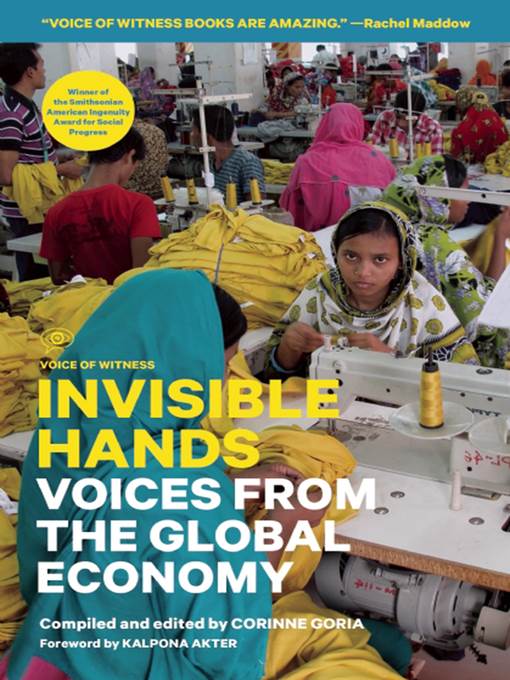
Invisible Hands
Voices from the Global Economy
- اطلاعات
- نقد و بررسی
- دیدگاه کاربران
نقد و بررسی

March 10, 2014
Compiled and edited by lawyer Goria, these oral accounts of labor abuses and the struggles of the working poor cover most corners of the globalized economy. Stories from workers and labor activists in far-flung locations, including Mexico, Zambia, Bangladesh, China, and South Korea, convey a sobering uniformity of harsh working conditions, low wages, coerced labor, and ruthless retribution against unions and advocates for workers’ rights. Readers hear from Bangladeshi garment workers who struggled to get monthly minimum wages raised from $15 in 1994 to $43 by 2010; Indian farmers trapped in a cycle of borrowing, debt, and bankruptcy; and the Chinese factory worker whose journey to the electronics manufacturing hub of Shenzhen started with excitement and ended with an accident that cost him a hand. A more hopeful strain about the resilience of labor emerges in some narratives: “Never think that you’re less than the boss,” counsels Ana Juarez, a Mexican garment worker and activist. As Kalpona Akter, a Bangladeshi labor rights advocate, says: “It was hard for me to tell my story for this book and to make my life so public” but... “if it lets another woman who has faced exploitation and repression feel that she is not alone, and even encourages her to speak up, then it is worth it.”

April 15, 2014
A compelling message about the plight of labor workers worldwide. In association with Voice of Witness, which spotlights global human rights crises, San Diego lawyer Goria assembles a series of eye-opening interviews by people hidden in the trenches of manual labor, a flourishing trade eclipsed by workplace grievances and global economic stratification. This unique compilation of histories demands attention and collectively has the impetus to inspire change. The range of these verbatim testimonies extends throughout the textile, agricultural, nonrenewable "resource extraction" and electronics industries, representing a wide swath of men and women spanning nearly a dozen countries. Among the diverse, impassioned voices are a Mexican garment worker who speaks out for those who are "denied work for fighting for one's rights"; a Northern California vineyard worker with heart problems who toiled through a rigidly structured "grape season"; a California military brat-cum-borax miner braving harsh, treacherous conditions and fierce union contract negotiations; and a Chinese factory worker in Shenzhen, reluctantly employed at one of the world's largest electronics manufacturers amid suicides and militant working conditions. Hope for change comes in various forms throughout Goria's collection, including the strides made by Bangladesh worker Kalpona Akter, who, after years working in a textile mill, became a staunch activist and labor rights advocate. Their common trait, aside from a laborious livelihood, is a marked desire to initiate a movement to bar unreasonable and perilous working conditions and unfair wages. Goria dramatically acknowledges the legion of overlooked workers who "produce the things we use every day," expressed through the carefully chosen words of crusaders who share each other's individual hopes and hardships. Powerful and revealing testimony to the injustices of manual labor, infused with inspiration for global change.
COPYRIGHT(2014) Kirkus Reviews, ALL RIGHTS RESERVED.

June 15, 2014
This book, edited by attorney Goria, uses oral history to introduce readers to 16 disadvantaged employees working in agriculture, the garment industry, natural resources, and electronics manufacturing in countries including India, Zambia, and the United States. These workers discuss their experiences with unsafe workplace conditions, organized labor, poor wages, and immigration. The interviews serve to educate readers about the working conditions of low-wage workers around the world and draw their attention to the challenges faced by employees toiling in less than desirable--and often unsafe--conditions. The book includes a time line of modern industrialization, a glossary, historical capsules providing context for the oral histories in the book, and an overview of the global decline of garment-industry wages. Readers interested in the plight of disadvantaged workers worldwide as well as the undesirable effects of globalization will be likewise interested in this book. VERDICT Recommended for a wide range of readers, from those served by high school libraries and public and academic ones as well.--Nathan Rupp, Yale Univ. Medical Lib., New Haven, CT
Copyright 2014 Library Journal, LLC Used with permission.




دیدگاه کاربران